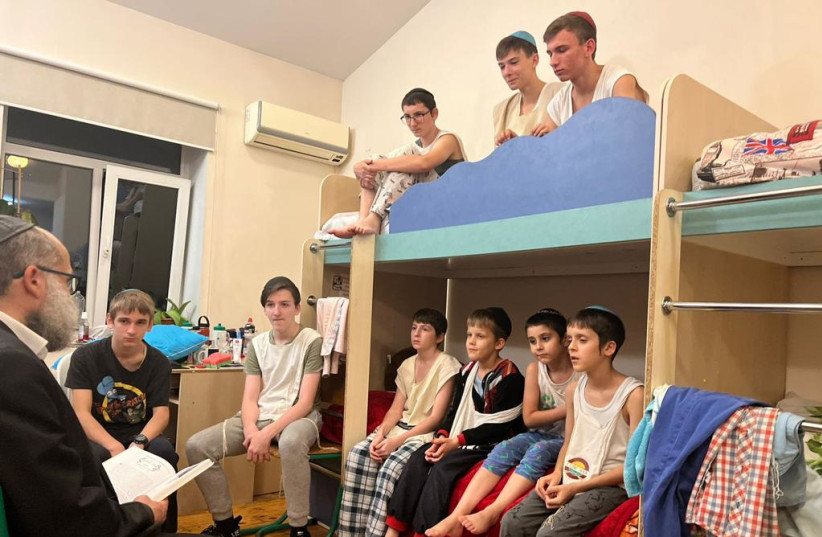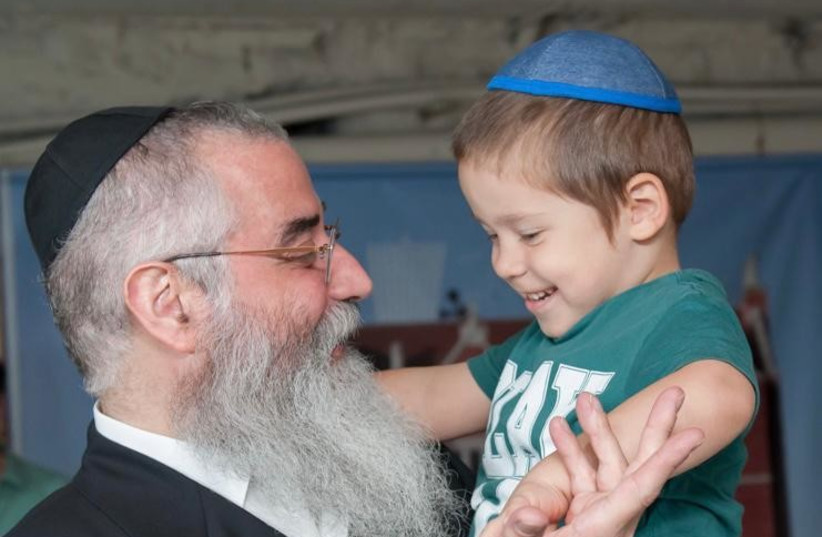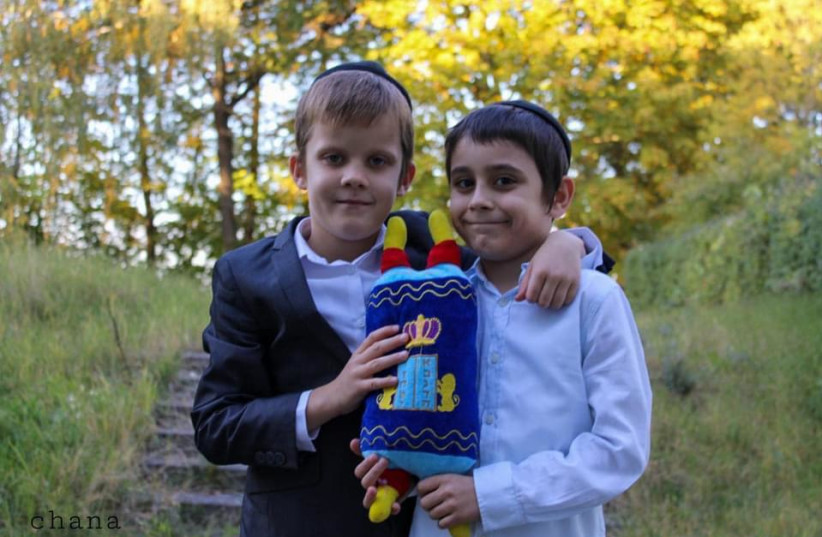Rabbi Avraham Wolff, the Rebbe’s shliach and Chief Rabbi of southern Ukraine, is no longer young, but his spirit was and remains young despite the whiteness that covers his growing beard. A constant glimmer can be seen in the pupils of his burning eyes. A smile rests almost permanently on his lips. His cheeks are flushed and his entire being is in constant agitation. Mildly effervescent.
I chose to open the conversation with him, in his modest office, hidden in the back of the Odesa Great Synagogue, in a non-routine way: From the climax,, from the heart of the drama that took place here, in this place, less than two weeks after the outbreak of Russia’s terrible war against Ukraine, when the whole world was convinced that within a few days, all of Ukraine would be occupied by the menacing Russian bear, and all the media covered with bated breath the convoy of weapons trucks that made its way to Kyiv and the warships that sailed towards the coast of Odesa.
What was your most difficult moment in those troubled days? I started with a question without leading up to it and background information.
My challenging question was answered without hesitation, specifying the exact date: “On Wednesday, in the second week of the outbreak of the war, we decided to move the two “Mishpacha” orphanages to Berlin. During the entire week leading up to that, we had a real nightmare week. And another month before that, before the news was officially published that Russia had invaded Ukraine and thus gave the signal for the outbreak of war, we began to get organized.
“There were good reasons that this could not be taken lightly. First of all, seven Russian warships anchored off the coast of Odesa. And as if that was not enough, Russian President Vladimir Putin, who in those days the whole world followed every word that came out of his mouth, twice mentioned Odesa as one of his obvious destinations.
“You have to remember that this was before it became clear to everyone that the Russian bear would be clumsy and unsuccessful and unable to meet any goal it set for itself. So, in the days before the war and in its first days, everyone was sure and convinced that it was only a matter of a few days until all of Ukraine was occupied by Russia.
“Well, we ourselves live no more than two hundred meters from the sea. Our orphanages are also scattered over different places in the same range. It was impossible to remain indifferent and wait for them to come with folded hands. Our first stage of organizing was at the level of paperwork. In the two “Mishpacha” orphanages for boys and girls, 120 children are being raised and educated.”
His first attempt was to obtain for every one of them the most basic documents that would allow them to cross the borders when this would be essential. It soon became clear that most of them did not have passports.

“You have to jump the gun a bit before you visit the orphanages and see these souls with your own eyes. Some of the children came with birth certificates straight from the delivery room. Others who came to us in later years and were given by relatives, such as grandmothers or aunts, were only given copies of the documents. All the original documents remained in the hands of the relatives. Try to imagine crossing a border, during a war, with only a birth certificate in your hands and you are already a grown-up boy with nothing that can connect you with the single piece of paper you carry in your hands.
“On the face of it, it was hopeless to even think about the possibility of leaving. But the situation that arose was impossible. In the first two days after the outbreak of the war, a curfew was imposed on the city. It was impossible to move in the streets. It was not possible to deliver food from our active kitchen where we cook food every day for both the orphanages and for the seven thousand families and the shelters who rely on the sustenance that we provide for them every day. For this purpose, we recruited a medical ambulance to transport hot soup to the old-age home and the children’s homes, (dry food and cans were in every building, ready for a situation like this)..
“Two days later, the curfew was lifted, but when we left the house, we discovered before our eyes the horrific sights of the damage caused by the Russian missiles that were launched without any control at a multitude of targets. Jews came to the synagogue in the morning with the paleness of fear of death covering their faces. The war had come to our home. And if this anxiety hit everyone, how much more so did it strike the orphans, who are like our children. In the middle of the night, to get up every few hours with young and older children and take them to the shelters. This fear surrounded them and paralyzed them. All the security that we instilled in them, which we worked so hard for, with dedicated and reinforced teams, 24 hours a day, seven days a week, was about to collapse and completely dissipate.
“We entered into a real operation out of a firm decision to take out the children from the war zone. I called neighbouring countries and tried to find a lifeline and humanitarian cooperation. Our lot fell on Germany.”
Igor Shatkhin, president of the Federation of Jewish Communities in Southern Ukraine, says: “We travelled for 52 hours straight. Along the way, we were stopped at several border crossing points. At each of these points, after brief questioning, representatives of the German border police commander got on the line and explained to the border crossing officers that the merciful individuals traveling on buses who had missing documents should not be impeded and that they should be allowed to continue their journey to a safe place. On Friday morning we arrived at the hotel in Berlin, which was empty of people in time and was right for us. Thus began a new life in this new place.
” Exactly that morning, Friday morning, was the day when the decision was made in Odesa to launch another parallel operation: the rescue of the women and children of the Jewish community. “The men,” explains Shatkhin, “they could not leave the city and the country because everyone without exception was declared to be conscripted because of the outbreak of the war. On Thursday evening, we sent a message to the entire community, women and children who want to go with us to Berlin, to register immediately by phone and report the next day at six in the morning. At the collection point, they arrived with belongings of no more than 10 kg. per person. No more could be allowed. The hysteria was so great that in less than an hour, 180 women and children signed up.

“And here I come to the question you asked me,” continues Rabbi Avraham Wolff: “What was the most difficult moment”? Well, on one side are women and children who are getting on the buses, and on the other side are the fathers and husbands of these women and children, who are saying goodbye with tears and hugs. Everyone was sure that this was it. The moment of their parting from the most precious to them. The atmosphere of the war was so palpable that no one had any doubt that this might well be the last time they would see each other.
“Tears poured out there like water. Both my wife and I cried like little children. Suddenly, in the middle of life, the same feeling penetrated our consciousness that we had only read about and heard about until now from the stories about the sons and daughters of the families who were forcibly separated from each other during the outbreak of the Holocaust. Tough men that we see every day who were well known to us as rough and crude, stood and sobbed there and found it difficult to say goodbye to their wives, and their children. Thus began the second journey.”
This journey also involved real devotion on the part of the Chabad emissaries in the city. “If our son Mendi with his wife Mushki and our little grandson Levik were entrusted with the first ‘Odesa departure’ of the orphans, this operation was managed by my wife, the rebbetzin. We decided so immediately. I, myself, as the rabbi of the city, knew very well that I would not be able to leave the elderly, the lonesome, and the confined Jews, as well as all the many young people who were forbidden to leave the borders of the city and the state because of its conscription obligation. It is my personal responsibility to continue to carry their burden and not abandon them.”
With supreme bravery, Rebbetzin Wolff set out at the head of the heroic journey from Odesa to Berlin.
Rebbetzin Wolf: “After the support we received from the German authorities, the departure of the orphanages went smoothly. Our son, Rabbi Mendi, told the sweet children that they were going to ‘winter camp’ together and they accepted it without questioning them. On the other hand, our journey was accompanied by a terrible nightmare. The mothers, who had just been forced to part with their husbands in what seemed at the time to be an eternal separation, were in mad hysteria. Every hour and a half on average we had to stop and medically treat a woman, a mother of a baby who had difficulty breathing, or a pregnant woman who lost consciousness... Women were hysterical and stressed, And really, it’s hard to describe in words. Luckily for us, among the women who ran away with us, there was a psychologist and a gynaecologist who helped them cope and calm down and practice breathing, during this crazy journey. “Within a year and a half of staying in Germany, all the institutions needed for the orderly operation of a Jewish community were established there. The rented hotel housed not only the orphanages but also the rest of the community’s survivors as well as the school and university.
Today, while we are sitting in his hive-like office in the heart of Odesa, Rabbi Wolff says in a clear voice, admitting and trusting: “The war is indeed not over, but with God’s blessing we met our goal. We brought everyone back here, without exception, safe and sound.”
And immediately after saying this, Rabbi Wolff adds and tells me about the names of those men, giving it a chilling illustration. “I will never forget Marik, one of the Chabad house’s close friends, waving goodbye to his six-year-old son and his pregnant wife, in the fifth month of her pregnancy.
You didn’t have to have a developed imagination back then to guess what was going through the father-husband’s mind in those stormy moments. Whether he will get to see the baby that will be born to him in four months or whether it will bear his father’s name, is not up to us - this is surely the question that preoccupied him during those unbearably difficult moments of parting. This is what he later testified in Rabbi Wolff’s ears. According to the atmosphere that was floating around then and because he knew that he had been drafted and that in a little while he had to report and be sent to the front - in his heart the fear was palpable, he explained that the second option to his question might be the correct one.
”Baruch Hashem, the baby was born on German soil, he was circumcised on the eighth day. And a few months ago, the mother and her two sons returned healthy and intact to Odesa and were reunited with Marik the father, who also survived the war and remains alive, to give thanks and praise, although he continues to be, from time to time, rushed to different points on the front and we pray for his safety and security every day.”
Over time, Rabbi Wolff and his army managed to issue German passports for the orphans. Despite this, the decision made last spring was to return to Odesa. “The orphaned children did not stop dreaming and asking: ‘When are we coming home’... Even though Germany in days of peace looks good, there is nothing like the feeling of home. This was so necessary for them and for the peace of mind so essential for them.”
Later, when I visit these orphanages, I will truly understand how any hospitality, no matter how warm, cordial, and caring, could not replace the amazing, well-equipped, and invested home that was built here for them.
During my visit, I pass between the Chabad educational institutions founded by Rabbi Wolff in Odesa - I see two kindergartens, an elementary school, a high school, a Jewish university, and more. During this war, over 500 people study, are educated, and eat every day in these institutions! Simply unbelievable. Towards the afternoon I arrived to visit the old-age home for Holocaust survivors, which Rabbi Wolff established in the city. It is home to almost 50 Holocaust survivors who received medical and nursing care (for those in need) and live in incredible comfort. Later in the day, I discovered in the Fantan neighbourhood, in one of the western entrances of the city, a long four-story building with two uses. One is temporary. Its three lower floors house over a hundred refugees from all over Ukraine, who live here in a temporary apartment that nobody knows when it will expire. On the impressive top floor overlooking the sea is the synagogue directed by Rabbi Mendi Wolff, who lives there with his wife and family in this building.

The busy day’s visit ends within the walls of the orphanage - the boys’ branch of “Mishpacha”, at 32 Bazarna St., not before a quick and polite visit to the gates of the girls’ orphanage, at 2 Iberskaya St. The heart melts at the sight of tender children who have neither a relative nor a saviour in their world. Instead of father or mother, in whatever language it may be, they think: “Rabbi Avraham” or “Rebbetzin Haya.” It’s hard to say goodbye to the older ones, some of whom also know how to speak Hebrew and English well, thanks to their studies.
They enter the place at infancy or at any rate in the first months of their lives, with a weak family background that cannot be digested and processed. And they continue from here to kindergarten, school, and university. The youngest child sheltered in this place and enjoying all its conditions is 33 days old, while the oldest has long since past the age of 20, having successfully attended the local university.
He describes the evidence of the relationship forged between him and each of the orphans sheltered there as tears appear in the corners of his eyes.
”There was an orphan boy here whose grandmother brought him at a very young age from the area of the city of Mykolaiv. At the age of 16, he immigrated to Israel as part of the Naale project and experienced a difficult absorption. When he grew up and set out on his way in life, he worked for a living as a construction worker. One day he was informed of the death of his beloved grandmother who brought him to us and cared for him, and once a year she would come to visit him... but she was his only relative. And when he heard of her death, he felt that the sky had fallen on him, and he had no reason to live. And he already put a foot to jump into the elevator shaft that was next to her on the roof floor of the building, and then in a flash, for one moment he remembered... But what would Rabbi Wolff say? It would hurt him so much when he heard... and he decided to stop. A few months later, he came to visit Odesa and told us about it...
“We are not sparing any financial and human effort to give the 120 children of “Mishpacha” everything they deserve and that life did not give them. We are helped by many organizations from around the world, such as Jewish Relief Network Ukraine (JRNU) or Kate and Marty Rifkin from the KMR Foundation, PLFA The Patrick and Lina Drahi Foundation and many other generous ones, but still, we need a lot of help from the world to continue to raise these children and prepare them for independent, full and successful lives” concludes Igor Shatkhin, president of the Federation of Jewish Communities in Southern Ukraine.
In the middle of Odessa’s seashore strip, a breakwater stands out in its presence. Birds of all kinds, flying over the sea, rest in it from their flight. The structure that casts black basalt stones is designed to guarantee the safe entry and exit of yachts anchored at the beach. After my visit to the place, I imagined in my mind that the great power of “Mishpacha” Chabad Odesa draws its inspiration from the breakwater that is one of the symbols of this city: between a stormy wave of tremendous momentum and the next wave that will come like the drums of war.
This article was written in cooperation with Mishpacha Orphanage
